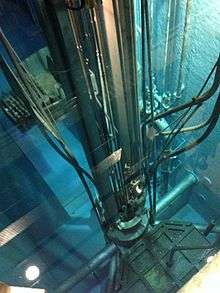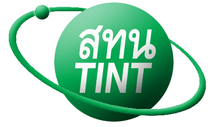Thailand Institute of Nuclear Technology
The Thailand Institute of Nuclear Technology (TINT) (สถาบันเทคโนโลยีนิวเคลียร์แห่งชาติ) is a public organization in Bangkok, Thailand.[1]

TRR1/M1 research reactor at the Thailand Institute of Nuclear Technology
| สถาบันเทคโนโลยีนิวเคลียร์แห่งชาติ | |
 | |
| Public organization overview | |
|---|---|
| Formed | 2006 |
| Type | research institute |
| Jurisdiction | Government of Thailand |
| Headquarters | Bangkok, Thailand |
| Public organization executive |
|
| Parent department | Ministry of Higher Education, Science, Research and Innovation |
| Website | www |
Overview
The institute is an entity established in December 2006 for national nuclear research and development. It is aimed to serve as the research body, cooperating with the Office of Atoms for Peace (OAP) who serves as the nuclear regulatory body of the country. TINT operates under Ministry of Higher Education, Science, Research and Innovation (MoST) and works closely with OAP and the International Atomic Energy Agency (IAEA).[2]
Research programs:
- Medical and Public Health
- Agricultural
- Material and Industrial
- Environmental
- Advanced Technology
Nuclear operations:
- Safety
- Nuclear Engineering
- Reactor Operation
gollark: *LPK* is *kotahu*?!
gollark: https://www.centauri-dreams.org/wp-content/uploads/2022/02/Starshot-scene-05-1024x682.jpg
gollark: Empirically, 6_4's face is this:
gollark: Fear my ultrawide brain monitor™.
gollark: Imagining reality is quite easy, fortunately.
External links
| Wikimedia Commons has media related to Thailand Institute of Nuclear Technology. |
- สถาบันเทคโนโลยีนิวเคลียร์แห่งชาติ website (Thai)
- Thailand Institute of Nuclear Technology (TINT) website Archived July 22, 2012, at the Wayback Machine
References
This article is issued from Wikipedia. The text is licensed under Creative Commons - Attribution - Sharealike. Additional terms may apply for the media files.